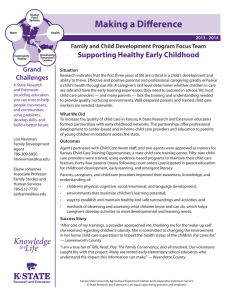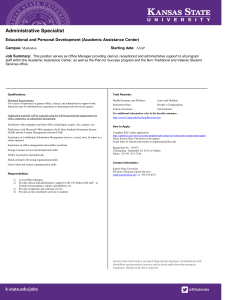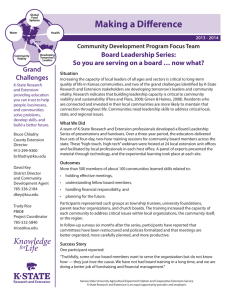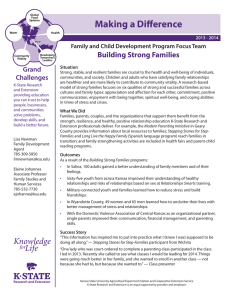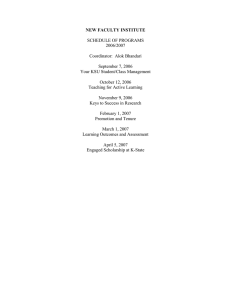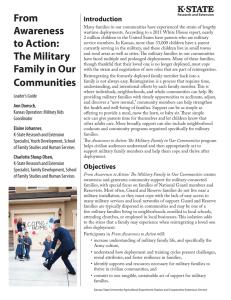Document 13271687
advertisement
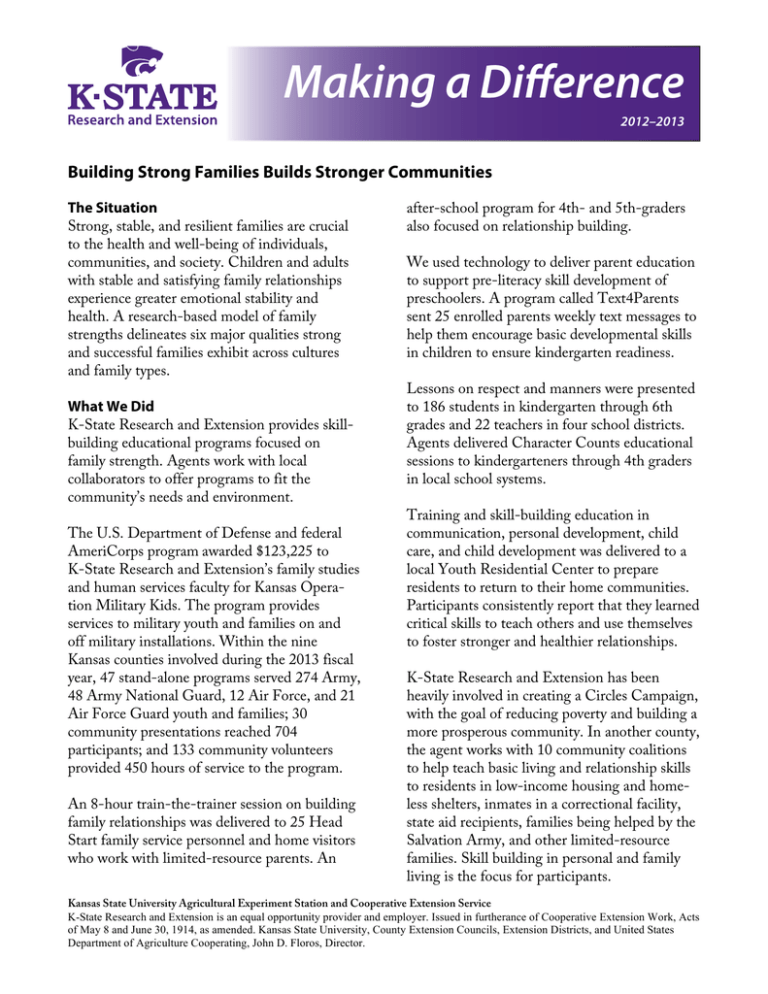
Making a Difference 2012–2013 Building Strong Families Builds Stronger Communities The Situation Strong, stable, and resilient families are crucial to the health and well-being of individuals, communities, and society. Children and adults with stable and satisfying family relationships experience greater emotional stability and health. A research-based model of family strengths delineates six major qualities strong and successful families exhibit across cultures and family types. What We Did K-State Research and Extension provides skillbuilding educational programs focused on family strength. Agents work with local collaborators to offer programs to fit the community’s needs and environment. The U.S. Department of Defense and federal AmeriCorps program awarded $123,225 to K-State Research and Extension’s family studies and human services faculty for Kansas Operation Military Kids. The program provides services to military youth and families on and off military installations. Within the nine Kansas counties involved during the 2013 fiscal year, 47 stand-alone programs served 274 Army, 48 Army National Guard, 12 Air Force, and 21 Air Force Guard youth and families; 30 community presentations reached 704 participants; and 133 community volunteers provided 450 hours of service to the program. An 8-hour train-the-trainer session on building family relationships was delivered to 25 Head Start family service personnel and home visitors who work with limited-resource parents. An after-school program for 4th- and 5th-graders also focused on relationship building. We used technology to deliver parent education to support pre-literacy skill development of preschoolers. A program called Text4Parents sent 25 enrolled parents weekly text messages to help them encourage basic developmental skills in children to ensure kindergarten readiness. Lessons on respect and manners were presented to 186 students in kindergarten through 6th grades and 22 teachers in four school districts. Agents delivered Character Counts educational sessions to kindergarteners through 4th graders in local school systems. Training and skill-building education in communication, personal development, child care, and child development was delivered to a local Youth Residential Center to prepare residents to return to their home communities. Participants consistently report that they learned critical skills to teach others and use themselves to foster stronger and healthier relationships. K-State Research and Extension has been heavily involved in creating a Circles Campaign, with the goal of reducing poverty and building a more prosperous community. In another county, the agent works with 10 community coalitions to help teach basic living and relationship skills to residents in low-income housing and homeless shelters, inmates in a correctional facility, state aid recipients, families being helped by the Salvation Army, and other limited-resource families. Skill building in personal and family living is the focus for participants. Kansas State University Agricultural Experiment Station and Cooperative Extension Service K-State Research and Extension is an equal opportunity provider and employer. Issued in furtherance of Cooperative Extension Work, Acts of May 8 and June 30, 1914, as amended. Kansas State University, County Extension Councils, Extension Districts, and United States Department of Agriculture Cooperating, John D. Floros, Director. Outcomes One local unit celebrated more than 20 years of coordinating Parents’ University in which 30 agencies have collaborated to address family and child issues. Approximately 7,000 parents have participated and they consistently indicate that they gain information and skills to strengthen their families. A stress management program was delivered to community groups. Participant comments included: • “It’s sometimes hard to think of stress as a choice, but this really drove home that it is a conscious choice and I can make a different choice.” • “I never realized how much stress affects our body, and the biological component to that. I found it interesting that a ‘stressful reaction’ can lower my immune function for hours after the situation occurred.” An outdoor program for families called G2G — Got 2 Go (Outside) — was offered in one county. Success Stories In the 8-hour relationship training session for Head Start, participants indicated they learned different ways to use effective and positive communication skills, parenting skills to share with different family types, benefits of conflict resolution, co-parenting tips, parenting strategies for better relationships with children, how to de-escalate situations, how to help families compromise, and new ideas to communicate the importance of father involvement. • One participant said she learned “to view things in a new perspective as a single mother and how I can take the knowledge, put it to good use, and share with other families.” • Another participant mentioned learning “some characteristics that will improve communication in my home life and professional life.” • One appreciated learning “to be more aware of how I am communicating with family.” Families in a “Circles of the Heartland” community recently graduated from a 15-week training class. During the training, a single mom was chosen as a Habitat for Humanity home recipient, and she credits her “Circles” involvement for much of her motivation and courage to apply. Two single moms are now pursuing college degrees. Another positive result is increased social capital of the families, who report they have doubled or tripled the number of people in their lives that they can count on, indicating stronger support systems as a result of their participation. Those who have completed the entire 18-month program in Kansas report a 20% reduction in debt and a nearly 70% reduction in public benefits. Participants also see a modest increase in their income — about 15% — as well as a nearly 20% increase in assets. Contacts Charlotte Shoup Olsen Family Studies and Human Services Specialist 785-532-1948 colsen@ksu.edu Elaine Johannes Family Studies and Human Services/Youth Development Specialist 785-532-7720 ejohanne@ksu.edu Bradford Wiles Assistant Professor, Early Childhood Development 785-532-1939 bwiles@ksu.edu Pat Gerhardt Family and Consumer Sciences Agent River Valley District 785-243-8185 pgerhard@ksu.edu Lisa Newman Family and Consumer Sciences Agent Central Kansas District 785-309-5850 lmnewman@ksu.edu
